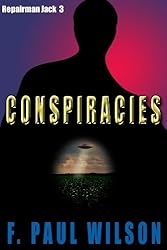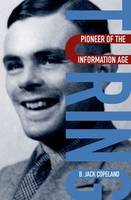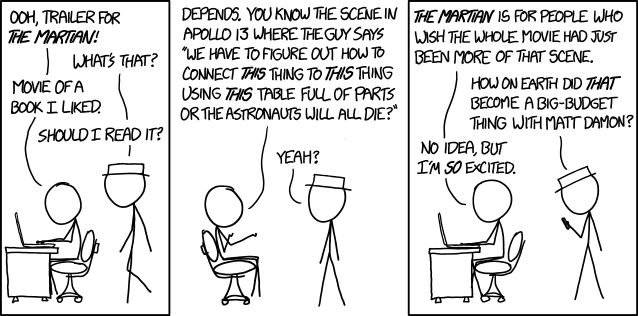Busy week, some misery, some fun - and see my Facebook posts for the baby seal I met.
Meanwhile, literary criticism. 23-30 June 2015
OK this week we finished
The Long Earth - Stephen Baxter and Terry Pratchett
The Shipping News - E. Annie Proulx
The Calculus diaries - Jennifer Ouellette
In reverse order
Jennifer Ouellette is probably very nice and certainly capable. Her publishers perhaps did her no favors with the cover and title of this book, but maybe I'm being picky since their intention is of course to attract those readers for whom calculus is anathema (ooo, look at the big word). Trouble is, it turns off anyone who isn't already a maths geek when they see the word 'calculus' in the title. The attempt to make it sexy with the byline 'A year discovering maths will help you lose weight, win in vegas and something zombie apocalypse' (there's a library sticker on the cover)
The rear says 'as amusing as it is enlightening' (ok, but a very Victorian comment). 'The tales …will captivate even the most maths-phobic' (lies). 'If, like me, you love the neatness of calculus…' (I do, but you lost me at 'like')
It goes on, and there is some positive info on the back, but really, we gave up -unless you really like maths, you won't pick this up.
SO is it worth the read? Well, I think so. There is a slow and gentle introduction to what in America they call precalculus. The 'driving to Vegas' section is clear, although I found it dull - and I know she was trying so hard to make it interesting. Maybe it was the Prius - the most boring car ever - and the only way it becomes interesting is when you spend hours watching the fuel consumption display.
But don't let that stop you. JO introduces the derivative and the integral with insight and understanding and perhaps does this better than anyone I've read. She works hard to make this MEAN something, not just be an exercise in putting numbers into a formula. For that, she deserves credit for the whole book. And that credit is soon extended. It keep getting better, with real life examples, as alluded to on the cover, on house buying and the GFC, gambling, the design and construction of cathedrals, and so on. It is explained in language that my 13 year old can follow, but the maths is developed to a useful level.
I found it frustrating sometimes when concepts were introduced without the rigor that I expected, or were introduced but without context and evolution - some of the section on log and exponent explained that they were opposite and complementary, leaving me wanting the rest of the chapter. This is of course the problem with a book that aims to demystify a topic - we look to go deeper, but we aren't the target audience. The challenge for the author is to give the reader a comprehensible taste of the topic, and lead them into further reading, without losing the novice, or the expert, along the way.
This book walks that line well. Perhaps not perfectly, but the sins are of omission not commission. The book could go deeper, be longer, but then it would lose the simplicity and friendliness that it aimed for.
So then, why does it have such an awful cover and title? Hmmm, could just be me. Could be the publisher. Probably isn't the author.
note that the book I read doesn't have the funky roller coaster cover, but the messy looking one that reminded me of the 'Working Title' movies like Notting hill. Which perhaps means I'm not the intended reader [I like Hugh Grant OK, but maybe not in everything. You don't want to go Adam Sandler here…]
Anyway, that's how I felt. A re-read might smooth it out, but right now, I enjoyed it with annoyance, probably won't re-read. Back to the library for you…
Book 2 for the week - E Annie Proulx. I read this when it came out, (Mum was a librarian so when I went home during my University holidays in the mid 1990s she brought home stacks of books that she though I might like. She was usually right, but it put the pressure on me to get through them all)
E Annie Proulx is a pretty good writer. I know this because the tag line on the cover says 'winner of the Pulitzer prize for fiction 1994'
So I think I read this in 1995, probably in a hurry to give it back to Mum while I was visiting for a few days.
I didn't like it. I didn't like 'A Perfect Storm'* either. Actually there are a lot of books I've read partly because of their reputation, which I have disliked. Luckily, I am patient, read fast, and I'm a hoarder, so even the ones I didn't like get their chance to come through again (OK given the 5000 thing that we started off with on this blog, this may change).
So - when I read it through the first time, as a reader of Science Fiction and Fantasy primarily, I looked at the hints of magical realism in the book, and fixated on the grotesque. I found the characters repellent and the story to be if not unbelievable, then implausible.
Second time through (probably third, but I didn't track it) and I have enjoyed this a lot more. I'm sure Ms Proulx will be pleased to hear it. OK there are some issues that need addressed:
E Annie Proulx. I don't know what to call her. E? Annie? Proo or Prowlx or Prowl? It matters- because if I don't know, I won't risk pronouncing it wrongly in a group. Disney got this, putting 'EEE-gor' and 'Rat - a - too -eee' on the cover of their cartoon dvds. Insulting to adults who might know the correct pronunciation, but targeted exactly correctly at the customer. So Ms E assumes that the reading public will go to the trouble of finding out. OK, most will - and of course your name is your name and I will do you the honor of finding out ---
[*another book Mum brought home and I read in a hurry - no other link to Ms P other than the sea….]
(It's 'Pru' and the E seems to be optional)
Anyway, magical realism? The book is WRITTEN, which is nice. I could see the rivets and bolts this time through. The symbols are clashed together (see what I did there) and the motifs of death and life and love and hope and despair are woven pretty tightly. The magic is in the use of language - you get flummoxed by the knots at the opening of each chapter, looking for the meaning, but within that is the sexuality of the women, the desperate longing of the men. The social commentary as developed through the articles in the newspapers. It's really good when you are aware of it; I suspect that my earlier readings were done by a younger person without insight, and perhaps rushed. This time through, older and I hope wiser, I see different things. Yes the symbolism of the knotted strings left at the house is left for the reader to explore, although the link between Agnis as an upholsterer and the old man as a knotter is interesting. Yes the slow blossoming of Quoyle as he finds usefulness and value in his life is mirrored by the story that shows Dennis and his family and their battle with the sea and drowning. The dark secrets of the Quoyles were more significant to me first time through; the darkness in the towns with the sexual abuse and alcoholism and despair resonated more this time.
The themes of escape to Florida contrast with the awareness that escape is temporary, that a Newfoundlander is always called home, and the underlying belief that leaving is always temporary as those who leave meet horrible ends is fascinating and deserves better exploration than I'm going to go into here - but doubtless others have explored this. For me the really interesting thing that I enjoyed a lot was the way Ms Proulx used language to chart the voyage of Quoyle from big chinned useless lump to valued member of the community. Her descriptive prose began the process, but she dropped that once the story got under way. The boat building metaphor is perhaps the pivotal one - after Quoyle nearly drowns when his boat sinks, he commissions another from Alvin Yark. Alvin is a relative of Wavey Prowse, which gives him significance - without that, we have no context - and his skills are rooted in time and tradition but the magical realism is invoked here again as he shapes timber into a boat frame. Quoyle undergoes a transformation as the boat takes shape and it becomes clear after the party when Nutbeem's boat is wrecked (sorry, spoilers all the way, but you probably already know this and even if you don't, the story is worth the read - like a Robertson Davies, it isn't the story, it's the language you read for) that Quoyle has made the transformation like an ugly duckling/caterpillar to butterfly.
Quoyle shows this in several ways - the descriptive prose first - it stops with the defensive gestures, the attempts to make himself smaller and to hide his 'Quoyleness'. But the sentences go all Hemingway - read it and tell me I'm wrong. He goes native. Chopped, brief sentences, with a cadence and a rhythm that seemed alien when he moved into the community but now, he's one with them, he speaks like them, he has come home.
It's an elegant technique and having seen it, I am looking for it again. Well played, Ms Proulx - wish I'd thought of it first…
I read the end of the book in bed. Woke early, before the dawn. Laid a while. Read a chapter, then another. Felt the light break, and the new day rise over the house like fog flows up the harbor. Rising, still half asleep, I broke eggs into a bowl and looked to them, scrying the coming day while gulls peel the wind from the blasted rocks. Turned eggs and bacon on the plate like curls of cedar from a plane. Outside the dog cried back to the lightening sky and whalebacks blistered the smooth water of the harbor and the sound of their breath was the sound of loss.

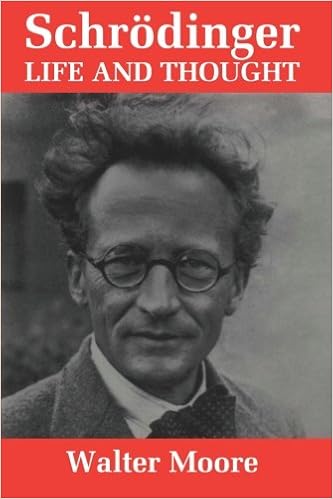



















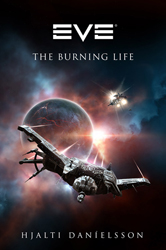

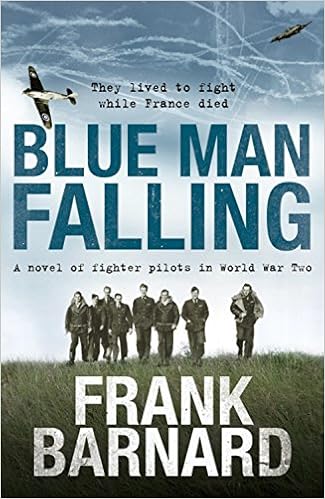
 The pictures are out of order, but this is the book I read first - and really enjoyed. As above, Alex writes clearly and well, keeps you interested, and tells the good stories about number theory and history with the kind of storytelling I used to do. Very enjoyable and would dip in again to remind me. Certainly would read any other books by Alex.
The pictures are out of order, but this is the book I read first - and really enjoyed. As above, Alex writes clearly and well, keeps you interested, and tells the good stories about number theory and history with the kind of storytelling I used to do. Very enjoyable and would dip in again to remind me. Certainly would read any other books by Alex.
